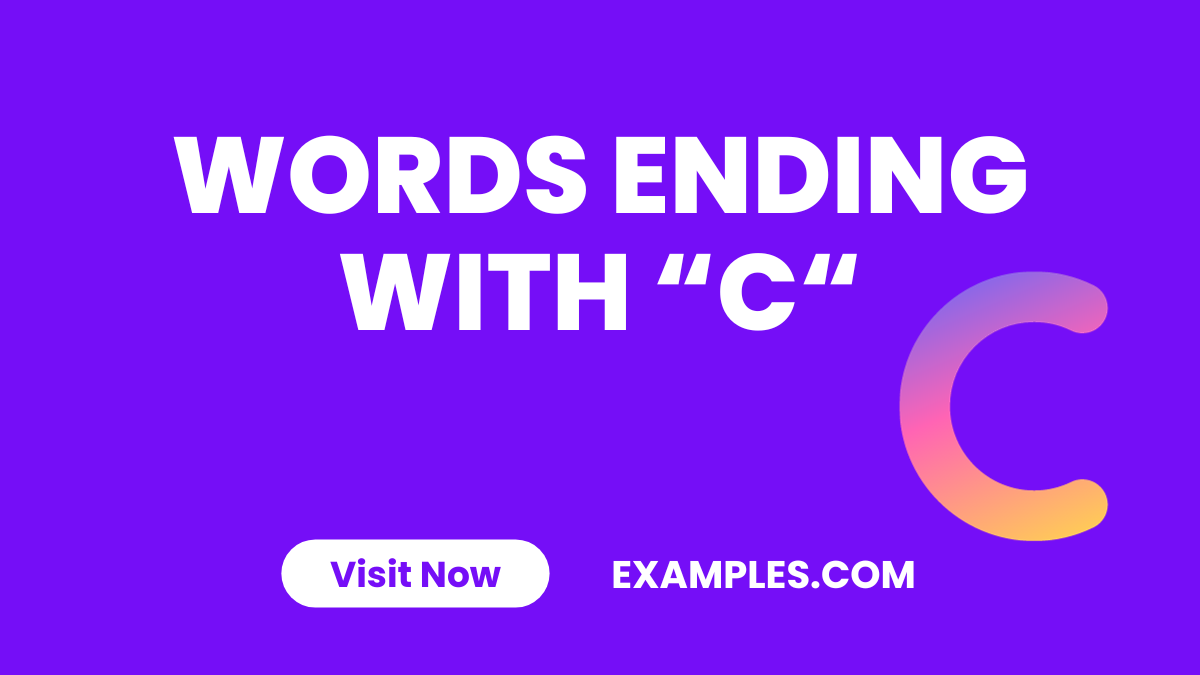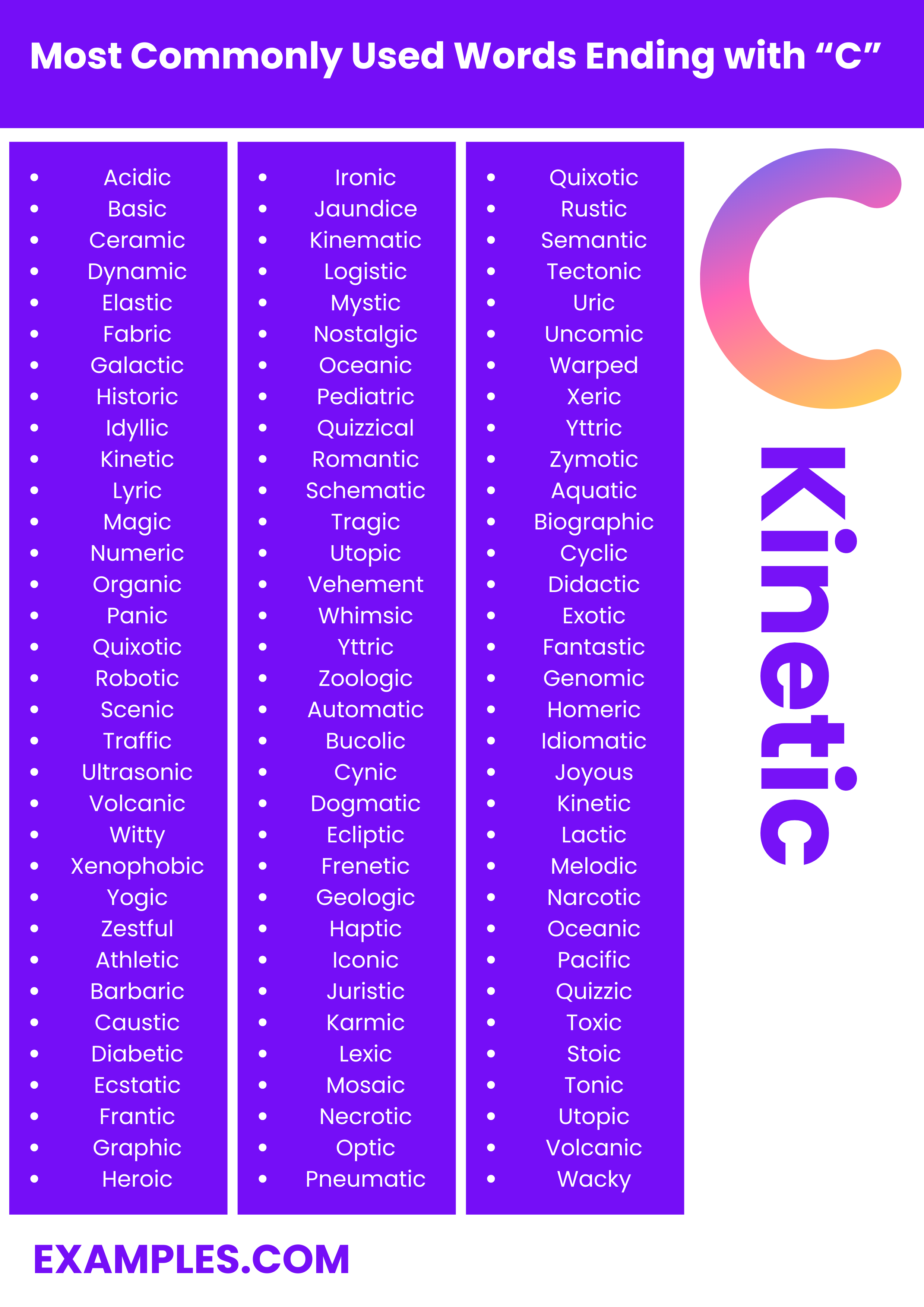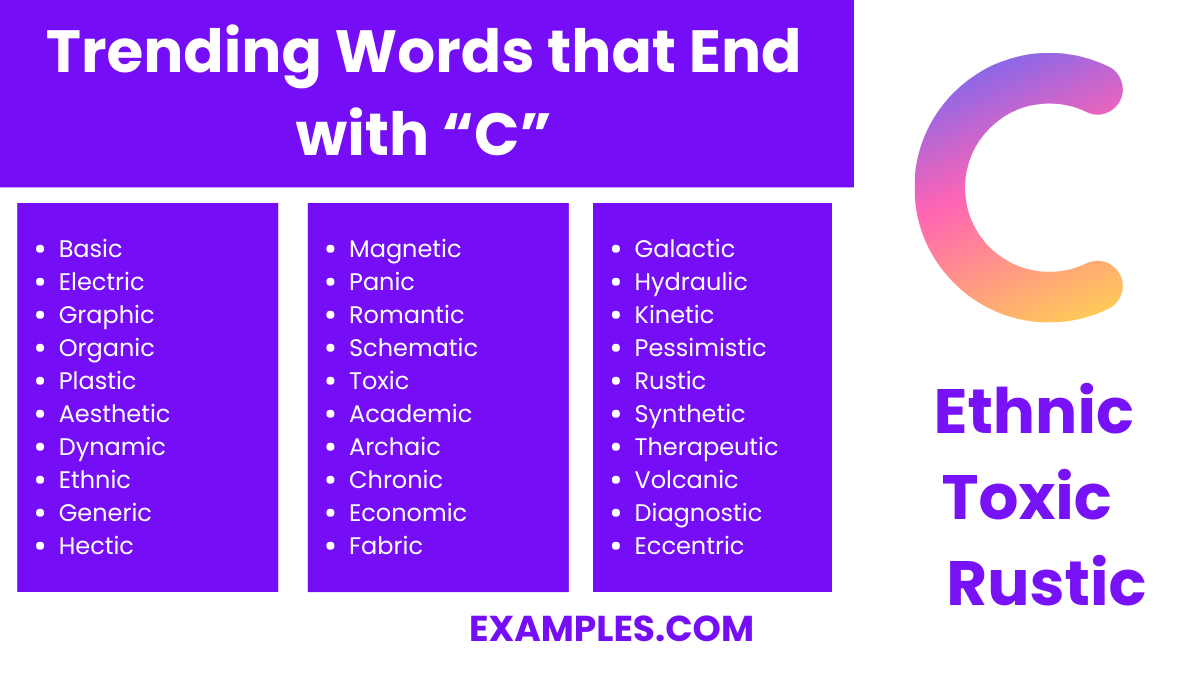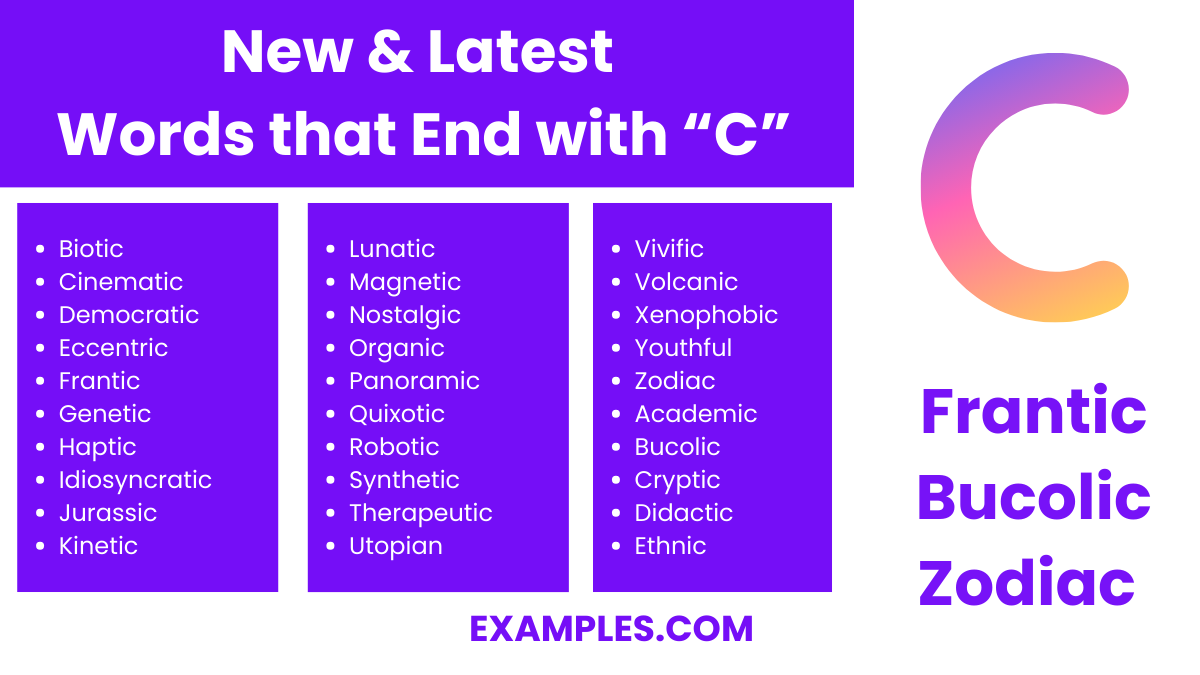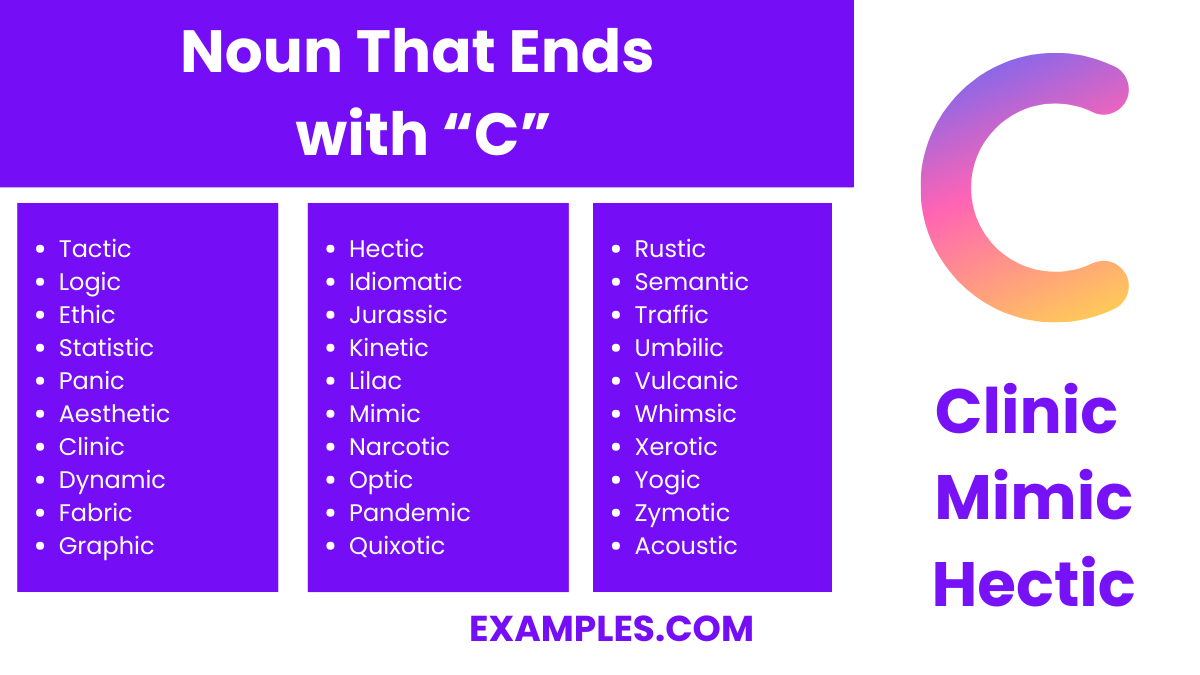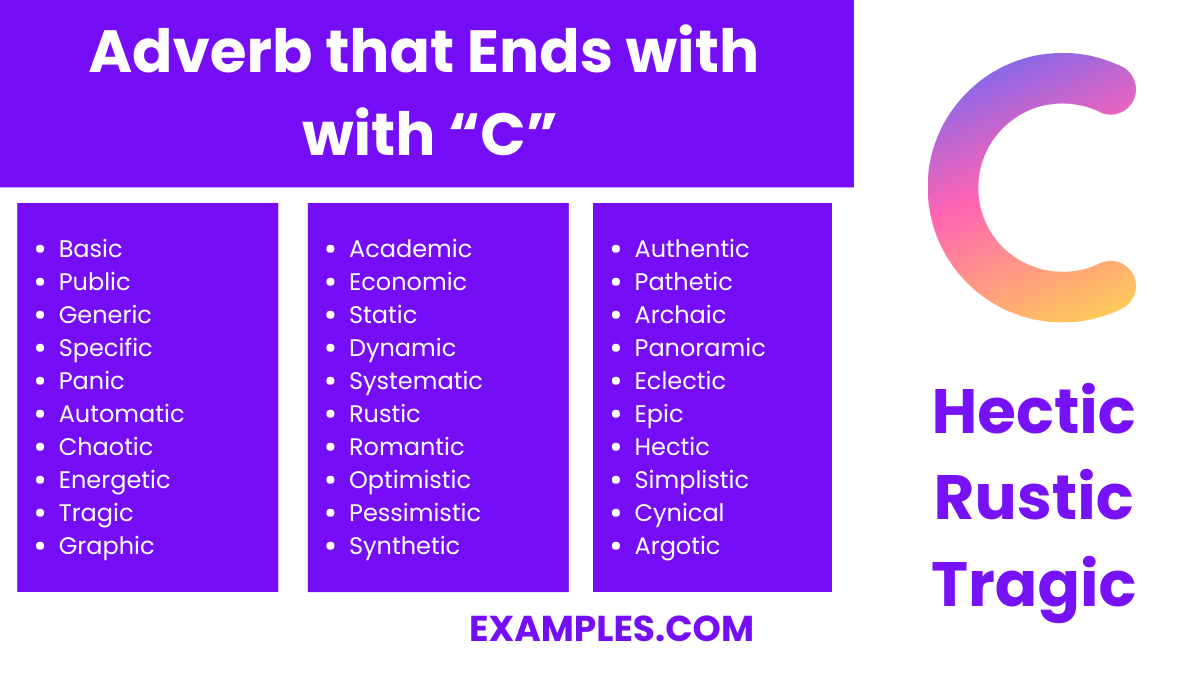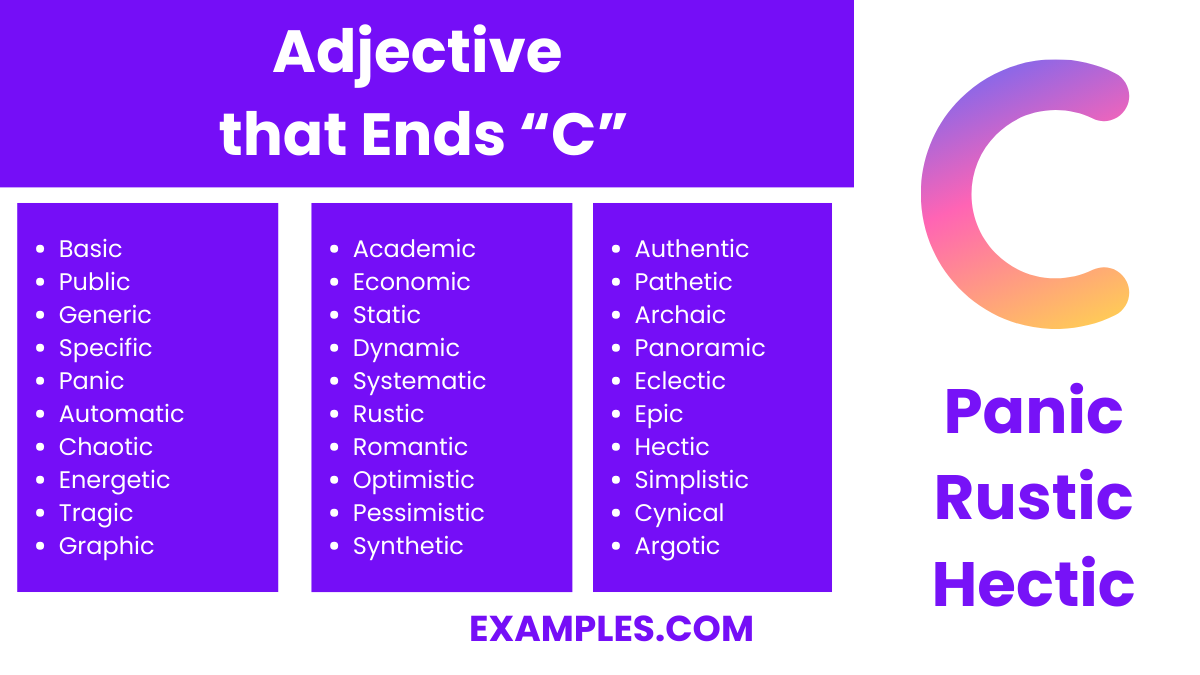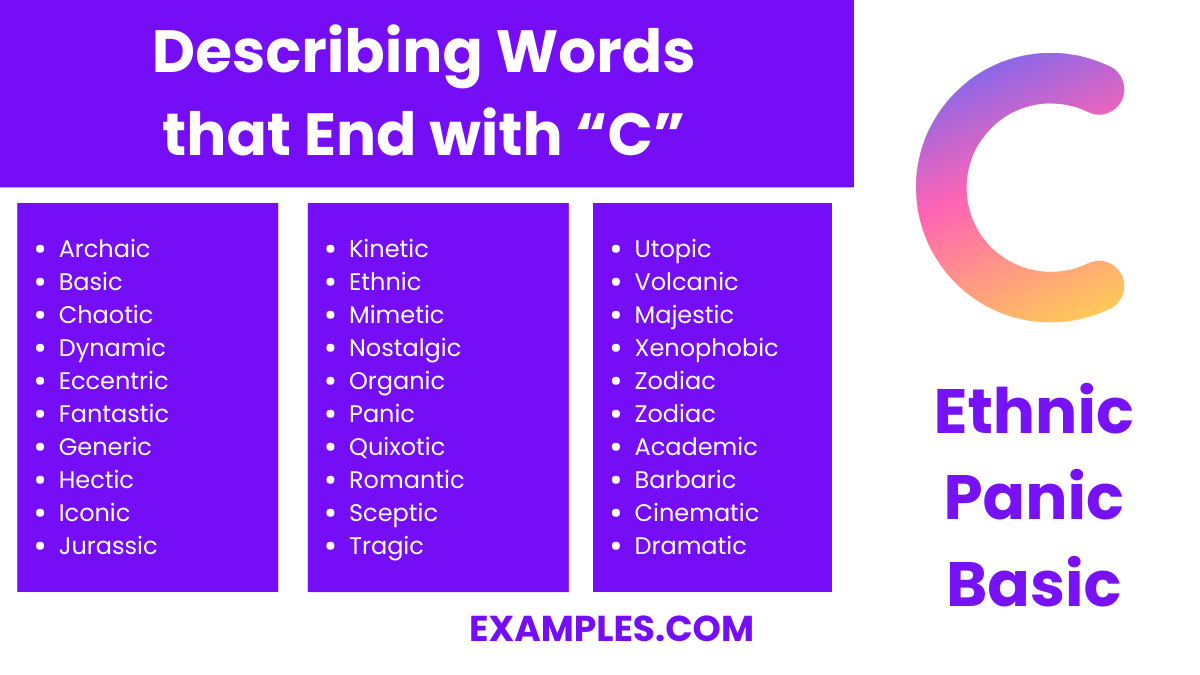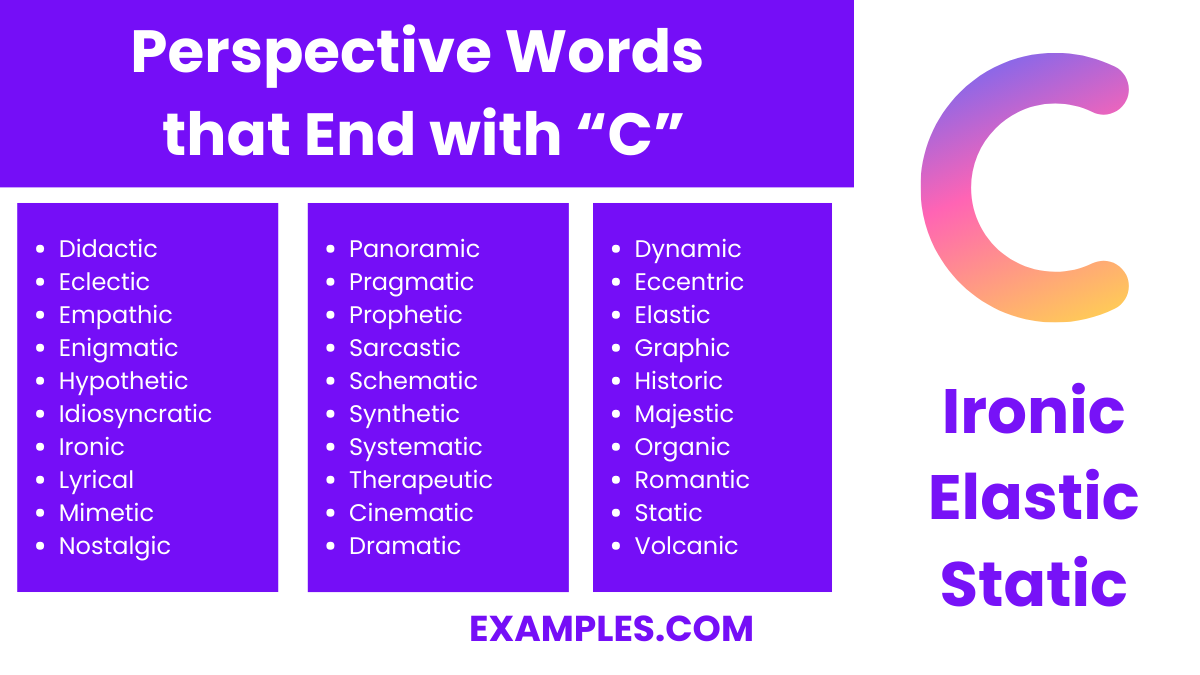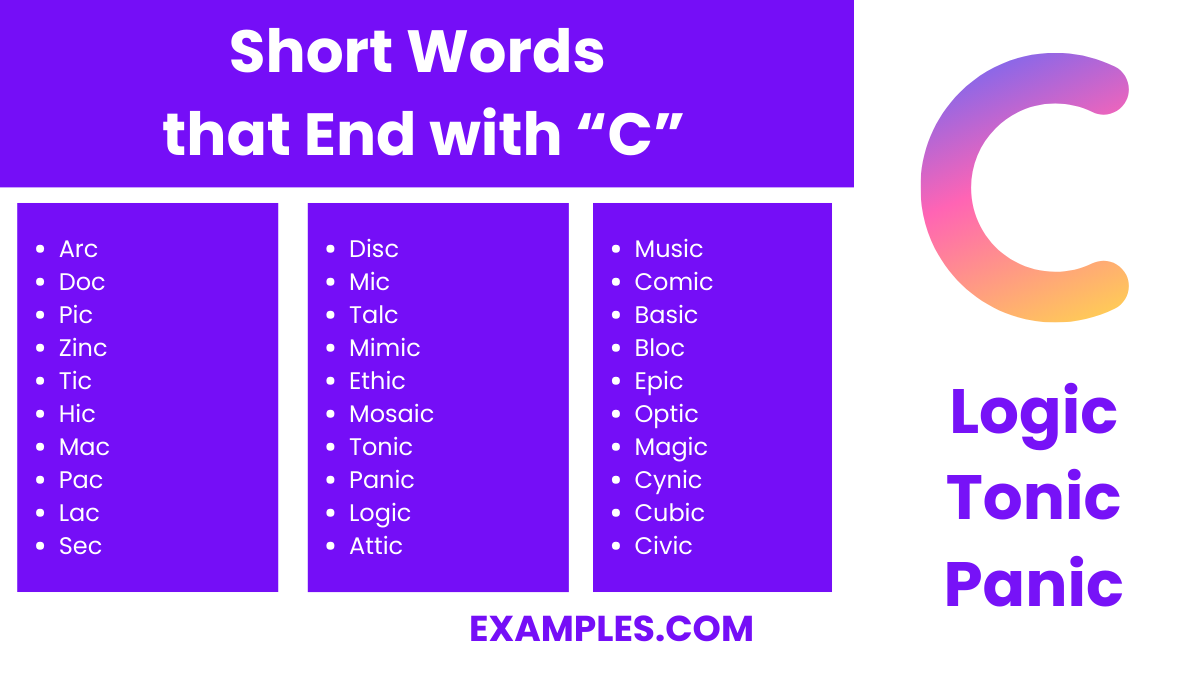Words Ending with C
Exploring words that end with the letter ‘C’ opens up a fascinating aspect of the English language, both for teachers and students. This guide is designed to help educators introduce these words in a compelling way, enhancing students’ vocabulary and communication skills. Ending in ‘C’ Words often possess unique sounds and meanings, making them vital in diverse linguistic contexts. From improving spelling to enriching writing, understanding these words is crucial for effective communication. Let’s delve into tips and strategies to teach and utilize these words effectively in various educational settings.
Download Most Commonly Used Words Ending with C - PDF
150 Most Commonly Used Words Ending with “C”
To aid educators in expanding the vocabulary of their students, especially those learning English, I’ve curated a selection of 150 words that terminate with the letter ‘C’. This assortment spans from routine vernacular to more sophisticated terms, catering to a broad spectrum of educational levels. Offered in a tabular layout for straightforward reference, this exhaustive compilation serves as a priceless tool for teachers. It’s crafted to not only bolster students’ verbal capabilities but also to deepen their comprehension of word endings and their application across diverse scenarios. Incorporating rhyming words and daily use english words that conclude with ‘C’, this list aims to significantly enhance linguistic proficiency and understanding.
| Acidic | Basic | Ceramic | Dynamic | Elastic | Fabric |
| Galactic | Historic | Idyllic | Kinetic | Lyric | Magic |
| Numeric | Organic | Panic | Quixotic | Robotic | Scenic |
| Traffic | Ultrasonic | Volcanic | Witty | Xenophobic | Yogic |
| Zestful | Athletic | Barbaric | Caustic | Diabetic | Ecstatic |
| Frantic | Graphic | Heroic | Ironic | Jaundice | Kinematic |
| Logistic | Mystic | Nostalgic | Oceanic | Pediatric | Quizzical |
| Romantic | Schematic | Tragic | Utopic | Vehement | Whimsic |
| Yttric | Zoologic | Automatic | Bucolic | Cynic | Dogmatic |
| Ecliptic | Frenetic | Geologic | Haptic | Iconic | Juristic |
| Karmic | Lexic | Mosaic | Necrotic | Optic | Pneumatic |
| Quixotic | Rustic | Semantic | Tectonic | Uric | Uncomic |
| Warped | Xeric | Yttric | Zymotic | Aquatic | Biographic |
| Cyclic | Didactic | Exotic | Fantastic | Genomic | Homeric |
| Idiomatic | Joyous | Kinetic | Lactic | Melodic | Narcotic |
| Oceanic | Pacific | Quizzic | Toxic | Stoic | Tonic |
| Utopic | Volcanic | Wacky | Xylographic | Aphetic | Zygotic |
Most Trending Words that End with “C”
In today’s fast-paced educational environment, keeping up with the latest trends in the English language is essential for effective teaching, especially when it comes to words frequently used in science, technology, and contemporary vernacular. This focus is particularly pertinent for teachers looking to improve their students’ communication abilities and vocabulary. Such words, emblematic of modern usage, are vital not just for the academic development of students but also for their understanding of the world around them. By weaving singular & plural words and christmas words into their lessons, educators can offer a learning experience that is more engaging, relevant, and comprehensive, thus significantly enhancing the linguistic understanding and capabilities of their students.
- Basic – Fundamental, simple, or essential.
- Electric – Pertaining to or operated by electricity.
- Graphic – Relating to visual art or descriptive in a vivid way.
- Organic – Derived from living matter; natural.
- Plastic – A synthetic material made from various polymers.
- Aesthetic – Concerned with beauty or the appreciation of beauty.
- Dynamic – Characterized by constant change, activity, or progress.
- Ethnic – Relating to a population subgroup with a common cultural tradition.
- Generic – Characteristic of or relating to a class or group of things.
- Hectic – Full of incessant or frantic activity.
- Magnetic – Exhibiting or relating to magnetism.
- Panic – Sudden uncontrollable fear or anxiety.
- Romantic – Conducive to or characterized by the expression of love.
- Schematic – Representing in simplified or symbolic form.
- Toxic – Poisonous.
- Academic – Relating to education and scholarship.
- Archaic – Very old or old-fashioned.
- Chronic – Persisting for a long time or constantly recurring.
- Economic – Relating to economics or the economy.
- Fabric – Cloth produced by weaving or knitting textile fibers.
- Galactic – Relating to a galaxy or galaxies.
- Hydraulic – Operated by, moved by, or employing water or other liquids in motion.
- Kinetic – Relating to or resulting from motion.
- Pessimistic – Tending to see the worst aspect of things or believe that the worst will happen.
- Rustic – Relating to the countryside; rural.
- Synthetic – Made by chemical synthesis, especially to imitate a natural product.
- Therapeutic – Relating to the healing of disease.
- Volcanic – Relating to or produced by a volcano or volcanoes.
- Diagnostic – Concerned with the diagnosis of illness or other problems.
- Eccentric – Unconventional and slightly strange.
New & Latest Added Words that End with “C”
In the constantly shifting landscape of the English language, the emergence of new words is a continual process that enriches vocabulary and opens up new pathways for expression. This section highlights the newest and most recently added words, showcasing the dynamic essence of language as it adapts to novel concepts, technologies, and cultural shifts. These additions are crucial for any language curriculum, especially for students eager to keep pace with the latest developments in contemporary language use. Incorporating compound words and consonant words allows teachers to guide their students to the cutting edge of linguistic progress, thereby bolstering their ability to communicate effectively in modern contexts
- Biotic – Relating to or resulting from living things.
- Cinematic – Pertaining to the art or technique of motion-picture photography.
- Democratic – Relating to or supporting democracy or its principles.
- Eccentric – Unconventional and slightly strange behavior or character.
- Frantic – Wild or distraught with fear, anxiety, or other emotion.
- Genetic – Relating to genes or heredity.
- Haptic – Relating to the sense of touch.
- Idiosyncratic – Peculiar or individual.
- Jurassic – Relating to the period of the Mesozoic era.
- Kinetic – Relating to or resulting from motion.
- Lunatic – An extremely foolish or eccentric person.
- Magnetic – Exhibiting or relating to magnetism.
- Nostalgic – Feeling a sentimental longing for the past.
- Organic – Relating to or derived from living matter.
- Panoramic – With a wide view surrounding the observer.
- Quixotic – Exceedingly idealistic; unrealistic and impractical.
- Robotic – Relating to or characteristic of robots.
- Synthetic – Made by chemical synthesis, especially to imitate a natural product.
- Therapeutic – Relating to the healing of disease.
- Utopian – Modeled on or aiming for a state in which everything is perfect.
- Vivific – Making something more lively or vivid.
- Volcanic – Relating to or produced by a volcano or volcanoes.
- Xenophobic – Having or showing a dislike of or prejudice against people from other countries.
- Youthful – Remaining young and energetic.
- Zodiac – A belt of the heavens within about 8° either side of the ecliptic.
- Academic – Relating to education and scholarship.
- Bucolic – Relating to the pleasant aspects of the countryside and country life.
- Cryptic – Having a meaning that is mysterious or obscure.
- Didactic – Intended to teach, particularly in having moral instruction as an ulterior motive.
- Ethnic – Relating to a population subgroup with a common national or cultural tradition.
Noun That Ends with “C”
For educators, delving into the diverse facets of language, such as nouns ending in ‘c’, is imperative. This section unveils a carefully selected array of nouns that finish with the letter ‘c’. These terms span a multitude of domains, including science, technology, culture, and daily existence. Concentrating on such distinct word categories can profoundly expand students’ vocabularies, facilitating their ability to articulate complex notions succinctly. This compilation is especially valuable for readying students for academic and competitive tests, where a comprehensive vocabulary is indispensable. Incorporating describing words and dictation words that conclude with ‘c’ enriches this endeavor, offering students enhanced tools for description and precise communication.
- Tactic – A method or strategy to achieve a particular goal.
- Logic – Reasoning conducted or assessed according to strict principles of validity.
- Ethic – A set of moral principles.
- Statistic – A fact or piece of data from a study of a large quantity of numerical data.
- Panic – Sudden uncontrollable fear or anxiety.
- Aesthetic – A set of principles guiding the work of a particular artist or artistic movement.
- Clinic – A place or hospital department where outpatients are given medical treatment or advice.
- Dynamic – A force that stimulates change or progress.
- Fabric – Material, typically produced by weaving or knitting textile fibers.
- Graphic – A visual representation of data or artistic design.
- Hectic – Full of incessant or frantic activity.
- Idiomatic – Using expressions that are natural to a native speaker.
- Jurassic – A geological period or system.
- Kinetic – The energy that a body possesses by virtue of being in motion.
- Lilac – A pale violet color.
- Mimic – A person skilled in imitating the voice, mannerisms, or movements of others.
- Narcotic – A drug affecting mood or behavior.
- Optic – Relating to the eye or vision.
- Pandemic – A disease prevalent over a whole country or the world.
- Quixotic – A visionary project or scheme.
- Rustic – The countryside, especially when regarded as charmingly simple.
- Semantic – Relating to meaning in language or logic.
- Traffic – Vehicles moving on a road or public highway.
- Umbilic – The navel or a central point.
- Vulcanic – Relating to or resembling volcanoes.
- Whimsic – A whimsical or fanciful ornament.
- Xerotic – A condition characterized by dry skin.
- Yogic – Relating to yoga.
- Zymotic – Relating to fermentation.
- Acoustic – Relating to sound or the sense of hearing.
Adverb that Ends with “C”
In the intriguing world of English language learning, adverbs hold a critical role in enhancing communication. This guide zeroes in on a particularly fascinating group: adverbs. These adverbs transcend mere vocabulary status, serving as instruments that introduce nuance and precision to linguistic expression. For both educators and learners, mastering these adverbs can greatly improve the quality of expression in written and spoken English. This meticulously compiled list is not only a tool for expanding students’ linguistic arsenal but also a window into the subtle shifts in meaning these adverbs contribute to sentences. As language continually evolves, understanding these nuances is essential for proficient communication and comprehension, especially in advanced English studies. Including difficult words and encouraging words in this exploration enriches the learning experience, offering learners a balanced mix of challenge and motivation.
- Basic – In a fundamental, essential, or primary manner.
- Public – In a manner that is open to or involving people in general.
- Generic – In a way that relates to a class or group; non-specifically.
- Specific – In a precise or particular manner.
- Panic – Done in a sudden, uncontrollable fear or anxiety.
- Automatic – Happening as a result of a set procedure or system; without conscious thought.
- Chaotic – In a completely confused or disordered manner.
- Energetic – With a lot of energy and enthusiasm.
- Tragic – In a way that relates to or is characteristic of tragedy.
- Graphic – In a vivid and explicit manner.
- Academic – In a manner relating to education or scholarly activities.
- Economic – In a manner relating to economics or the economy.
- Static – In an unchanging, stationary manner.
- Dynamic – In a manner characterized by constant change, activity, or progress.
- Systematic – In a methodical way, according to a system or plan.
- Rustic – In a manner typical of the countryside; simple or plain.
- Romantic – In a way characteristic of or suggestive of romance.
- Optimistic – In a way that shows hopefulness and confidence about the future.
- Pessimistic – In a manner showing a tendency to see the worst aspect of things.
- Synthetic – In a way that is made by chemical synthesis, especially to imitate a natural product.
- Authentic – In a genuine, real, and true manner.
- Pathetic – In a manner that arouses pity, especially through vulnerability or sadness.
- Archaic – In an ancient or old-fashioned manner.
- Panoramic – In a way that relates to an unbroken view of an entire surrounding area.
- Eclectic – In a manner that derives ideas, style, or taste from a broad and diverse range of sources.
- Epic – In a manner relating to or characteristic of an epic or epics.
- Hectic – In a very busy and fast manner.
- Simplistic – In a way that oversimplifies something, especially by ignoring complexities.
- Cynical – In a way that shows a belief that people are motivated purely by self-interest.
- Argotic – In a way that is very characteristic to particular group of people
Adjective That Ends with “C”
Adjectives are akin to the hues on a language’s palette, crafting vivid imagery in the minds of readers and listeners alike. This compilation of adjectives serves as a valuable resource for educators intent on enhancing the descriptive prowess of their students. Each term within this collection is selected for its practicality and pertinence, equipping students with the means to imbue their descriptions with depth and precision. These adjectives possess the power to elevate mundane statements into expressions that are both vivid and impactful, significantly improving communication skills. The assortment is especially beneficial for students in the process of refining their writing and speaking capabilities, as it empowers them to convey their thoughts and emotions with greater clarity. Incorporating funny words and ness words into this array not only broadens the vocabulary but also introduces a balance of levity and specificity, further aiding students in crafting engaging and expressive content.
- Basic – Fundamental, essential, or primary.
- Public – Accessible to or shared by all people.
- Automatic – Happening or functioning without conscious thought or intention.
- Organic – Relating to or derived from living matter.
- Chaotic – In a state of complete confusion and disorder.
- Panic – Sudden uncontrollable fear or anxiety.
- Economic – Relating to economics or the economy.
- Systemic – Relating to a system, especially as opposed to a particular part.
- Specific – Clearly defined or identified.
- Terrific – Of great size, amount, or intensity.
- Hectic – Full of incessant or frantic activity.
- Ironic – Happening in the opposite way to what is expected.
- Graphic – Relating to visual art, especially involving drawing, engraving, or lettering.
- Classic – Judged over a period of time to be of the highest quality.
- Dynamic – Characterized by constant change, activity, or progress.
- Aesthetic – Concerned with beauty or the appreciation of beauty.
- Mosaic – Composed of a combination of diverse elements.
- Cinematic – Relating to motion pictures.
- Ethnic – Relating to a population subgroup with a common national or cultural tradition.
- Generic – Characteristic of or relating to a class or group of things.
- Idiomatic – Using expressions that are natural to a native speaker.
- Lyrical – Expressing the writer’s emotions in an imaginative and beautiful way.
- Rustic – Characteristic of rural life.
- Strategic – Relating to the identification of long-term or overall aims and interests.
- Tragic – Causing or characterized by extreme distress or sorrow.
- Romantic – Conducive to or characterized by the expression of love.
- Enigmatic – Difficult to interpret or understand; mysterious.
- Archaic – Very old or old-fashioned.
- Didactic – Intended to teach, particularly in having moral instruction as an ulterior motive.
- Manic – Showing wild and apparently deranged excitement and energy.
Describing Words That End with “C”
- Archaic – Belonging to an earlier period; ancient.
- Basic – Fundamental; forming an essential foundation.
- Chaotic – In a state of complete confusion and disorder.
- Dynamic – Characterized by constant change, activity, or progress.
- Eccentric – Unconventional and slightly strange.
- Fantastic – Extraordinarily good or attractive.
- Generic – Characteristic of a whole group; not specific.
- Hectic – Full of incessant or frantic activity.
- Iconic – Recognizable and emblematic.
- Jurassic – Relating to the period of the Mesozoic era.
- Kinetic – Relating to or resulting from motion.
- Ethnic – Relating to a population subgroup with a common national or cultural tradition.
- Mimetic – Imitative of something.
- Nostalgic – Longing for the past.
- Organic – Derived from living matter; natural.
- Panic – Sudden uncontrollable fear or anxiety.
- Quixotic – Exceedingly idealistic; unrealistic and impractical.
- Romantic – Conducive to or characterized by the expression of love.
- Sceptic – Inclined to question or doubt accepted opinions.
- Tragic – Causing or characterized by extreme distress or sorrow.
- Utopic – Idealistic or aiming for a perfect society.
- Volcanic – Explosive; relating to or produced by a volcano.
- Majestic – Having or showing impressive beauty or scale.
- Xenophobic – Having a fear or hatred for foreigners or strangers.
- Zodiac – Relating to the twelve signs of the zodiac.
- Zodiac – Relating to the twelve astrological signs.
- Academic – Relating to education and scholarship.
- Barbaric – Savagely cruel; exceedingly brutal.
- Cinematic – Relating to motion pictures.
- Dramatic – Exciting or impressive.
SAT Words that End with “C”
In our ongoing quest to support educators and augment students’ vocabulary, we’ve meticulously compiled a list of 30 SAT words. These terms are pivotal not only for SAT preparation but also for enhancing English communication skills. Rendered in a keyword-rich and instructive manner, these words are designed to be easily comprehensible and memorable. Educators play an essential role in navigating students through their academic journeys. By incorporating these words into your educational strategies, you can aid students in broadening their vocabulary, enhancing their understanding, and achieving superior outcomes in their SATs and everyday interactions. Including vowel words and tion words enriches this collection, further empowering students to excel in their linguistic endeavors.
- Apathetic: showing or feeling no interest, enthusiasm, or concern.
- Chaotic: in a state of complete confusion and disorder.
- Didactic: intended to teach, particularly in having moral instruction as an ulterior motive.
- Eclectic: deriving ideas, style, or taste from a broad and diverse range of sources.
- Fanatic: filled with excessive and single-minded zeal.
- Generic: characteristic of or relating to a class or group of things; not specific.
- Hectic: full of incessant or frantic activity.
- Idiosyncratic: peculiar or individual.
- Jurassic: relating to the second period of the Mesozoic era, a time when dinosaurs were predominant.
- Kinetic: relating to or resulting from motion.
- Lethargic: affected by lethargy; sluggish and apathetic.
- Mimetic: relating to, constituting, or habitually practicing mimicry.
- Narcotic: a drug or other substance affecting mood or behavior and used for pleasure or to reduce pain; addictive.
- Organic: relating to or derived from living matter; natural.
- Panoramic: (of a view or picture) with a wide view surrounding the observer; sweeping.
- Quixotic: exceedingly idealistic; unrealistic and impractical.
- Rhetoric: the art of effective or persuasive speaking or writing.
- Skeptic: a person inclined to question or doubt accepted opinions.
- Therapeutic: relating to the healing of disease.
- Utopic: modeled on or aiming for a state in which everything is perfect; idealistic.
- Mosaic: something made up of different parts that together form a pattern.
- Elastic: able to resume its normal shape spontaneously after contraction.
- Xenophobic: having or showing a dislike of or prejudice against people from other countries.
- Yogic: relating to yoga.
- Zodiac: relating to the twelve astrological signs.
- Academic: relating to education and scholarship.
- Bucolic: pertaining to the pleasant aspects of the countryside and country life.
- Cynic: a person who believes that people are motivated purely by self-interest rather than acting for honorable or unselfish reasons.
- Dramatic: relating to drama or the performance or study of drama.
- Eccentric: (of a person or their behavior) unconventional and slightly strange.
Perspective Words Ending with “C”
In the domain of English language education, providing students with a broad vocabulary is crucial. This particular section focuses on ‘Perspective Words’, a category that includes words often essential for understanding and expressing viewpoints, analyses, or interpretations. These terms not only expand students’ vocabulary but also enhance their comprehension and analytical capabilities. Acquaintance with these words improves their proficiency in articulating thoughts clearly and comprehending intricate texts. Incorporating transition words and action words into this selection further aids students in capturing various nuances of the English language, thereby facilitating academic success and effective communication
- Didactic – Intended to teach, particularly in having moral instruction as an ulterior motive.
- Eclectic – Deriving ideas, style, or taste from a broad and diverse range of sources.
- Empathic – Showing an ability to understand and share the feelings of another.
- Enigmatic – Difficult to interpret or understand; mysterious.
- Hypothetic – Based on or serving as a hypothesis.
- Idiosyncratic – Peculiar or individual.
- Ironic – Using or characterized by irony.
- Lyrical – Expressing the writer’s emotions in an imaginative and beautiful way.
- Mimetic – Imitative of something.
- Nostalgic – Characterized by or exhibiting feelings of nostalgia.
- Panoramic – With a wide view surrounding the observer.
- Pragmatic – Dealing with things sensibly and realistically in a way that is based on practical rather than theoretical considerations.
- Prophetic – Accurately describing or predicting what will happen in the future.
- Sarcastic – Marked by or given to using irony in order to mock or convey contempt.
- Schematic – (Of a diagram or other representation) symbolic and simplified.
- Synthetic – Made by chemical synthesis, especially to imitate a natural product.
- Systematic – Done or acting according to a fixed plan or system; methodical.
- Therapeutic – Relating to the healing of disease.
- Cinematic – Relating to motion pictures.
- Dramatic – Relating to drama or the performance or study of drama.
- Dynamic – Characterized by constant change, activity, or progress.
- Eccentric – (Of a person or their behavior) unconventional and slightly strange.
- Elastic – Able to resume its normal shape spontaneously after contraction, dilatation, or distortion.
- Graphic – Relating to visual art, especially involving drawing, engraving, or lettering.
- Historic – Famous or important in history, or potentially so.
- Majestic – Having or showing impressive beauty or dignity.
- Organic – Relating to or derived from living matter.
- Romantic – Conducive to or characterized by the expression of love.
- Static – Lacking in movement, action, or change.
- Volcanic – Relating to or produced by a volcano or volcanoes.
Short Words Ending with “C”
Introducing short words to students can be a highly effective method for broadening their vocabulary. These words, often simple yet versatile, are crucial for sentence construction and daily communication. Focusing on such words is particularly advantageous for young learners or those new to the English language, as short words are easily digestible and assist in the retention and application of new vocabulary. For educators, weaving these words into lessons can boost engagement, enhance spelling capabilities, and deepen understanding of word structures. This list serves not only as a convenient reference but also as a means to spark curiosity about the nuances of language. Including adverb words further enriches this educational endeavor, promoting a more comprehensive exploration of language.
- Arc – A part of the circumference of a circle or other curve.
- Doc – Informal for doctor.
- Pic – Slang for picture.
- Zinc – A chemical element, a metal often used for galvanizing iron and steel.
- Tic – A habitual spasmodic contraction of the muscles.
- Hic – A sound representing a hiccup.
- Mac – Informal term for a raincoat or mackintosh.
- Pac – Abbreviation for Political Action Committee.
- Lac – A resinous substance secreted by certain insects.
- Sec – Short for second, the base unit of time in the International System of Units.
- Disc – A flat, thin, round object.
- Mic – Short for microphone.
- Talc – A soft mineral used in powders and cosmetics.
- Mimic – To imitate or copy in action, speech, etc.
- Ethic – A set of moral principles or values.
- Mosaic – A picture or pattern produced by arranging together small colored pieces.
- Tonic – A medicinal substance taken to give a feeling of vigor or well-being.
- Panic – Sudden uncontrollable fear or anxiety.
- Logic – Reasoning conducted or assessed according to strict principles of validity.
- Attic – A space or room just below the roof of a building.
- Music – Vocal or instrumental sounds combined to produce harmony.
- Comic – Relating to comedy, amusing.
- Basic – Forming an essential foundation or starting point; fundamental.
- Bloc– A group of countries.
- Epic – A long poem, typically derived from ancient oral tradition.
- Optic – Relating to the eye or vision.
- Magic – The power of apparently influencing events by using mysterious forces.
- Cynic – A person who believes that people are motivated purely by self-interest.
- Cubic – Having the shape of a cube.
- Civic – Relating to a city or town, especially its administration.


